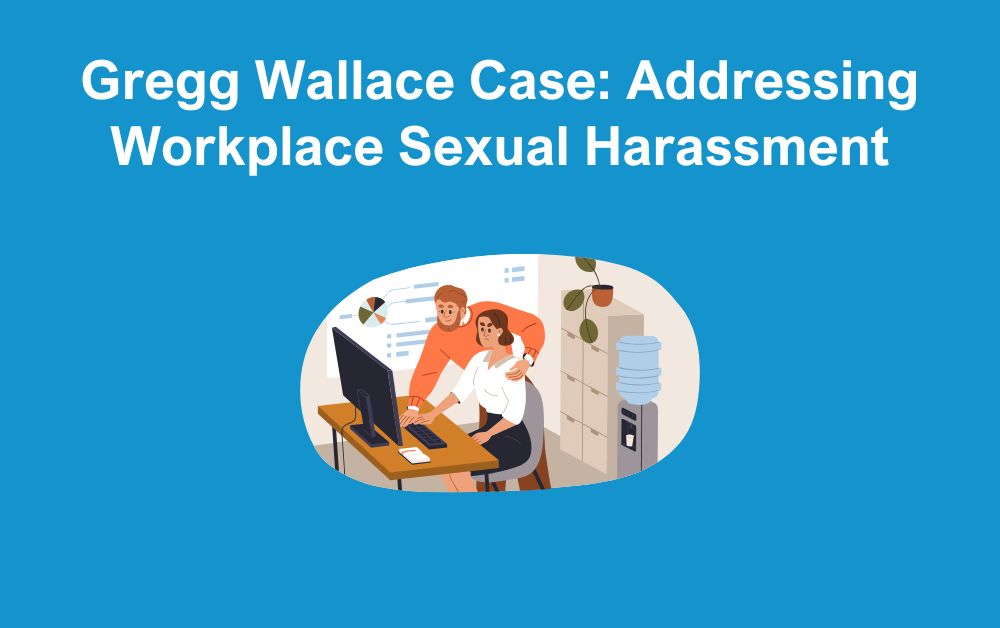The recent sexual harassment controversy involving Gregg Wallace has sparked significant public and media discourse in the UK. Wallace, a prominent television personality, found himself under scrutiny for allegations of inappropriate behaviour that reportedly made colleagues uncomfortable. Wallace made the questionable decision to publish a video on a popular social media platform where he at one point dismissed his accusers as “middle-class women of a certain age”.
This case underscores the pressing need for businesses and managers to address sexual harassment proactively and to foster a culture of respect and accountability in the workplace.
The Controversy: Understanding What Went Wrong
Wallace’s alleged behaviour, including inappropriate comments and actions towards colleagues, reveals a deeper issue about boundaries and respect in professional settings. While specifics of the case continue to emerge, it’s clear that crossing professional boundaries, especially in ways that make others feel uncomfortable or unsafe, is a serious matter.
The fallout from such allegations doesn’t just impact the individual accused; it can harm workplace morale, damage the organisation’s reputation, and result in significant legal and financial consequences. For Wallace, this has not only tarnished his personal brand but also sparked broader conversations about accountability in high-profile workplaces.
‘Banter’ in the Workplace
Some of the allegations against Gregg Wallace involve making inappropriate jokes towards colleagues, often dismissed as “banter.” Employers must understand that labelling potential sexual harassment behaviour as “banter” does not exempt it from being considered “unwanted” or inappropriate.
The EHRC Employment Code clarifies that “unwanted” is synonymous with “unwelcome” or “uninvited.” Importantly, conduct can still be deemed unwanted even if the individual does not explicitly object at the time. Employers should recognise that an employee’s apparent tolerance or even participation in such interactions does not automatically mean the behaviour is acceptable. It is crucial to address any conduct that could undermine a respectful workplace, regardless of how it is initially framed.
The Importance of Improving Company Culture
A strong, positive company culture is the foundation of a productive and respectful workplace. It sets the tone for how employees interact, establishes behavioural norms, and reinforces the organisation’s values. When company culture is neglected, issues like sexual harassment and misconduct can fester, leading to low morale, high staff turnover, and reputational damage.
The Gregg Wallace case underscores the critical need to prioritise company culture. Allegations of inappropriate behaviour highlight the potential for harm when cultural values around respect and professionalism are not upheld. By fostering a culture where employees feel safe, valued, and empowered to speak up, organisations can prevent such incidents and build an environment of trust and mutual respect. This not only protects employees but also strengthens the overall integrity of the business.
Where Managers and Businesses Must Intervene
Managers and organisations must be proactive in preventing sexual harassment. Here are some essential steps every workplace should take:
1. Implement Robust Policies
Every organisation should have a clear, comprehensive sexual harassment policy. This should define what constitutes harassment, provide examples, and outline consequences for violations. Importantly, the policy should be communicated to all employees during onboarding and reinforced through regular training.
2. Foster a Safe Reporting Culture
Employees need to feel safe and supported when reporting inappropriate behaviour. Establishing confidential reporting mechanisms, such as dedicated HR contacts or anonymous tip lines, can encourage individuals to speak up without fear of retaliation.
3. Provide Training and Education
Regular training on recognising and preventing harassment is essential. This should extend to all employees, including management, who must understand their responsibilities in addressing complaints effectively and promptly. We hav
4. Lead by Example
Leadership must set the tone for workplace culture. Managers who model respect and accountability create an environment where inappropriate behaviour is less likely to occur and where employees feel empowered to call it out.
5. Act Promptly on Complaints
Any reported instance of harassment should be investigated thoroughly and impartially. Swift action demonstrates the organisation’s commitment to a safe workplace and can prevent further issues from arising.
Addressing Behaviour: Lessons from the Sexual Harassment Duty
In the UK, the government is introducing a Sexual Harassment Duty. This will require employers to take proactive steps to prevent sexual harassment. This duty emphasises the importance of:
- Taking reasonable steps to safeguard employees from harassment, including by third parties.
- Demonstrating compliance with anti-harassment measures to avoid fines and legal repercussions.
This duty represents a shift from reactive to proactive approaches, reinforcing the need for businesses to be vigilant in preventing harassment before it occurs.
Practical Measures for Businesses
To comply with the Sexual Harassment Duty and minimise risks, organisations should:
- Conduct regular risk assessments to identify and mitigate potential areas of concern.
- Encourage bystander intervention by educating employees on how to safely intervene when witnessing inappropriate behaviour.
- Promote inclusivity and diversity, which can reduce the likelihood of power imbalances that contribute to harassment.
- Monitor workplace culture, using anonymous surveys or feedback tools to identify and address emerging issues.
Sexual Harassment Awareness Training with The HR Booth
Final Thoughts
The Gregg Wallace sexual harassment case is a stark reminder that inappropriate behaviour has no place in the workplace. It highlights the urgent need for businesses to implement preventative measures, address complaints effectively, and uphold a culture of respect and dignity.
By embracing the principles outlined under the Sexual Harassment Duty, organisations can not only protect their employees but also safeguard their reputations. Preventing sexual harassment isn’t just a legal obligation; it’s a moral imperative to ensure workplaces are safe and supportive for everyone.







